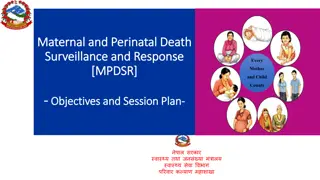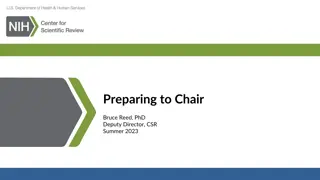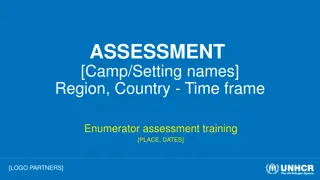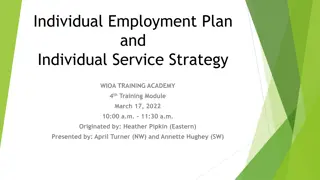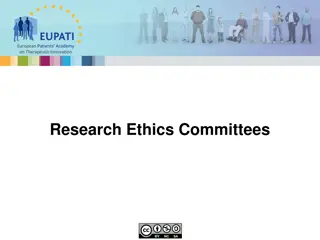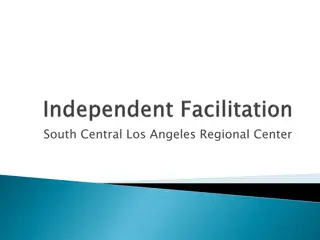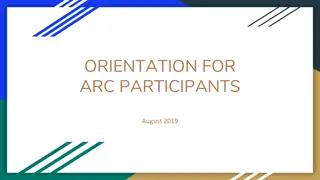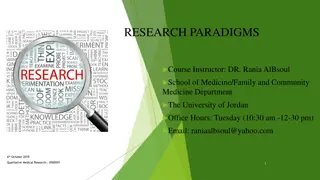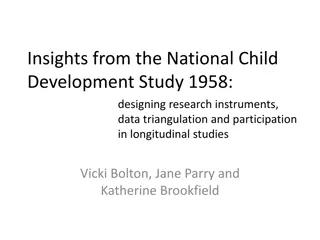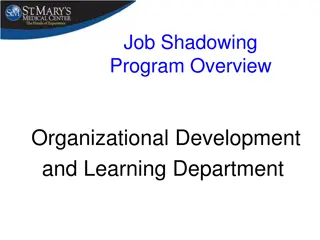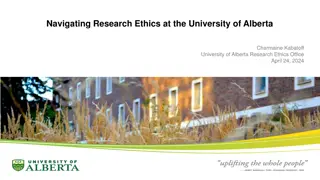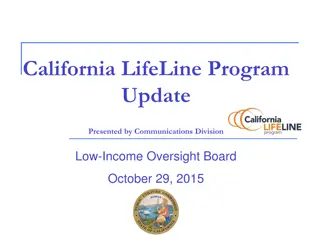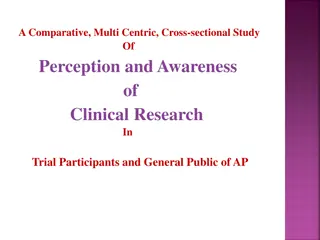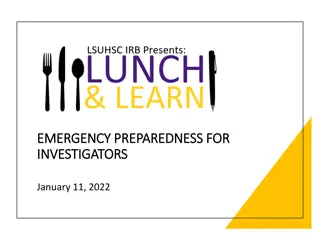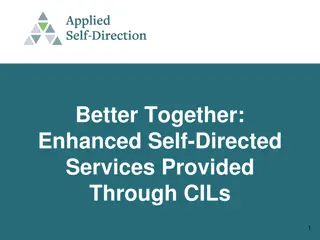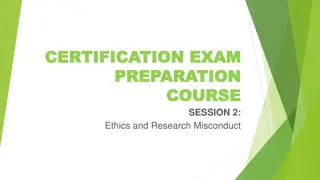Understanding Responsible Conduct of Research and IRB Overview
Delve into the world of research ethics through an overview of Institutional Review Boards (IRB), regulations governing human subjects research, historical events shaping research ethics, and examples of research controversies. Explore key ethical principles and the role of the IRB in protecting res
3 views • 34 slides
UCC Research Support and Strategies Overview
UCC's Research Support, Policy & Strategy function, led by David O'Connell, PhD, provides comprehensive support for research activities at the university. The office manages research funding, monitors performance, and facilitates engagement with external stakeholders. UCC's involvement in Horizon Eu
3 views • 17 slides
Maternal and Perinatal Death Surveillance and Response Orientation Program
This orientation program aims to equip participants with the knowledge and skills to understand and effectively implement Maternal and Perinatal Death Surveillance and Response (MPDSR) in hospitals. Participants will learn the rationale and process of MPDSR, complete review forms accurately, identif
1 views • 5 slides
Roles and Responsibilities of Study Section Chair and Meeting Participants
Understanding the distinct roles of study section chairs and meeting participants is crucial for effective research proposal evaluation. The study section chair leads discussions and implements policies, while meeting participants, including the Scientific Review Officer (SRO) and reviewers, play co
5 views • 14 slides
Skidmore Retirement Plans Update: Transition to Single Service Provider Information
Skidmore College is transitioning to TIAA as a single service provider for retirement plans. Stakeholders such as current participants, retirees, union members, and former employees are informed about the timeline, support measures, key dates, and informational events to facilitate a smooth transiti
2 views • 5 slides
Training Program Assessment and Monitoring in Humanitarian Field
This assessment training program focuses on preparing participants for data collection in humanitarian settings. It covers various aspects like welcoming participants, introducing them, setting administrative guidelines, promoting active participation, and outlining teaching methods. Security measur
0 views • 21 slides
Understanding Individual Employment Plan (IEP) and Individual Service Strategy (ISS) in WIOA Training Academy
Individual Employment Plan (IEP) and Individual Service Strategy (ISS) are essential components of the WIOA Training Academy, tailored to meet the career needs of participants under various WIOA programs. IEPs focus on personalized career services for adults and dislocated workers, while ISSs are sp
1 views • 23 slides
Understanding Research Ethics Committees in the European Patients Academy
Research Ethics Committees (RECs) play a crucial role in evaluating the ethical acceptability of research, ensuring the well-being and safety of research participants. This involves seeking ethical review and ongoing monitoring of research activities. RECs operate independently, have specific compos
1 views • 23 slides
Understanding Transitivity System in Grammar
The transitivity system in grammar helps speakers and writers convey ideational meaning by encoding their experiences of the world around them through participants, processes, and circumstances. This system categorizes participants as animate or inanimate, processes as material, mental, relational,
1 views • 14 slides
Understanding Independent Facilitators in the Self-Determination Program
Unique to participants in the Self-Determination Program, Independent Facilitators (IFs) play a crucial role in assisting individuals with transitioning into SDP, finding resources, negotiating rates, and advocating at meetings. Participants may choose to have an IF or have their Service Coordinator
1 views • 26 slides
Overview of Research Problem Identification and Formulation
Understanding the importance of defining a research problem, this content delves into the selection and formulation of research problems, the definition of a research problem, reasons for defining it, methods for identifying research problems, sources of research problems, and considerations in sele
1 views • 11 slides
Understanding Research Methods and Participants
Explore the differences between method and methodology, types of research methods and methodologies, characteristics of participants in studies, and inclusion/exclusion criteria. The content elaborates on the importance of rationale, justification, and techniques/tools used in research, along with e
0 views • 17 slides
ARC Mentorship Program Overview
The AfriWon Research Collaborative (ARC) offers a pilot program to provide mentorship for family physicians in sub-Saharan Africa. The program aims to support participants in developing research protocols through online modules and mentorship relationships. Participants will gain an understanding of
1 views • 19 slides
Understanding Research Paradigms in Qualitative Medical Research
Delve into the world of research paradigms in qualitative medical research with a focus on the key differences between objective and subjective research, the meaning of research paradigms, components of research paradigms, types of research paradigms, and how paradigms guide the selection of researc
0 views • 42 slides
Guidelines for Selecting Research Project Topics in Environmental Health
Research is crucial for addressing environmental health issues. Choosing a good research topic is the first step towards effective research. This paper discusses the meaning, characteristics, types of research, and the research process to help in selecting appropriate research topics. Understanding
0 views • 15 slides
Embedded Research Conference Workgroup B: Management Decisions Support
Workgroup B at the Embedded Research Conference focuses on providing research support for management decisions. The participants aim to identify and prioritize operational questions that could benefit from embedded research, work productively within the existing QI ecosystem, and create an inventory
0 views • 14 slides
Understanding Research Ethics at the University of Liverpool
Research Ethics at the University of Liverpool play a crucial role in ensuring the dignity, rights, safety, and well-being of human participants are respected and safeguarded. Ethical approval is mandatory for all research involving human participants, animals, their tissues, or data. Consent, priva
0 views • 14 slides
Impact of Shadow Boxing and Pad Work Training on Self-Confidence of Muay Thai Participants
Muay Thai participants at Revolt Gym engage in shadow boxing and pad work training to enhance their skills and build self-confidence. Self-confidence in sports is crucial for success, and these training methods play a significant role in developing mental and physical capacities. The study investiga
3 views • 8 slides
Special Olympics Return to Activity Code of Conduct June 2020
Special Olympics participants are required to adhere to strict safety guidelines to prevent the spread of COVID-19. This includes staying home if symptomatic, maintaining physical distance, wearing masks, and practicing proper hand hygiene. Participants with high-risk conditions are advised to avoid
0 views • 15 slides
Rotarians Inspired to Succeed & Engage: District 5030 Emerging Leader Program
A new leadership initiative, the District 5030 Emerging Leader Program, aims to cultivate and retain emerging leaders within Rotarian clubs. With a focus on service leadership, coaching, and mentorship, participants will engage in a 5-week hybrid program that blends in-person networking events with
0 views • 10 slides
Insights from the National Child Development Study: Research Instruments, Data Triangulation, and Longitudinal Participation
This research delves into the design of research instruments, data triangulation, and participation in the National Child Development Study of 1958 British birth cohort. The study covers the qualitative data collected up to 2008, with a focus on perennial participants, non-participants, frequent par
0 views • 15 slides
Techniques for Engaging Participants in Training Sessions
Learn effective strategies for engaging participants in training sessions, including altering activities, using icebreakers, incorporating interactive elements, and promoting learning through questioning. Explore Blooms Taxonomy and understand the importance of icebreaker activities in fostering gro
0 views • 9 slides
Comprehensive Course on Education Fundamentals and Research at University of Kalyani
This course offered by the University of Kalyani covers a wide range of topics in education including the foundations of education, psychology of learning and teaching, curriculum development and evaluation, types of research, basic research concepts, and statistics in research. Learners will develo
0 views • 9 slides
Job Shadowing Program Overview in Organizational Development and Learning Department
The Job Shadowing Program in the Organizational Development and Learning Department aims to provide participants with an opportunity to observe healthcare workers' daily routines, explore career interests in healthcare, and enhance awareness of the skills required in healthcare professions. Eligibil
0 views • 19 slides
Understanding Research Ethics at University of Alberta
Research at the University of Alberta involves disciplined inquiry aimed at extending knowledge, requiring approval from the Research Ethics Board for studies involving human participants. The process includes what research entails, what is not considered research, activities exempt from review, the
0 views • 21 slides
Feedback on Video/Phone Counselling Brief Intervention Service
A recent study involving 30 participants evaluated a Video/Phone Counselling Feedback Brief Intervention Service. The results indicated high levels of satisfaction, with 94% finding the service very or extremely helpful. Participants found it easy to engage with clinicians using video/phone, and a s
0 views • 25 slides
Integrating Families for Participant Recovery: Strategies and Partnerships
Families play a crucial role in supporting participants' recovery from high-risk behaviors. Understanding family dynamics, readiness for change, and potential barriers can enhance treatment effectiveness. Collaboration with agencies, organizations, and community partnerships further strengthens the
0 views • 16 slides
Comprehensive Research Integrity Programme for Researchers
Research Integrity Programme offering practical advice and professional guidance for researchers at all career stages. Led by renowned advisors and contributors, the program covers key aspects of research ethics and responsibilities, ensuring adherence to best practices throughout the research proce
0 views • 21 slides
Overview of California LifeLine Program Update - October 29, 2015
On October 29, 2015, the California LifeLine Program was updated with participation stats, wireless providers, pending providers, and total participants. The update includes a list of current and recently approved providers, along with the number of participants. The program had over 2 million parti
0 views • 19 slides
Perception and Awareness of Clinical Research in Trial Participants and the Public of Andhra Pradesh
This study focuses on understanding the perception and awareness of clinical research among trial participants and the general public in Andhra Pradesh. It highlights the importance of creating awareness about clinical research, previous study results, public attitudes towards clinical trials, and e
0 views • 24 slides
Research Ethics in Informal Economies: Insights from Heather Settle's Fieldwork
Heather Settle's fieldwork in Cuba and Nairobi sheds light on the challenges of conducting research in informal economies. She highlights the need to protect the identities of research participants engaged in illegal activities for survival. Settle emphasizes the importance of safeguarding sensitive
0 views • 4 slides
Global Research Nurses Network: Empowering Nurses in Research
The Global Research Nurses Network is a valuable resource for nurses involved in clinical research, nursing research, and utilizing research in their practice. It offers a platform for learning, development, and contribution within a community that values participants' voices and contributions. This
0 views • 22 slides
General Histopathology EQA Scheme in South East England
The General Histopathology EQA Scheme in South East England has been running for 20 years, allowing participants to test their diagnostic abilities. Participants select cases, provide diagnoses, and indicate confidence levels. The scheme is scored based on the accuracy of participants' responses. Th
0 views • 14 slides
Emergency Preparedness Guidelines for Research Investigators
These guidelines aim to assist research investigators in ensuring the continuity of research operations during emergencies involving drugs and devices. Key actions include obtaining emergency contact numbers, providing emergency cards to participants, securing essential files, communicating with res
0 views • 10 slides
Understanding Participant Selection in Research
Exploring the intricate process of selecting research participants, this content covers topics such as sampling methods, population versus samples, choosing the right participants, and the importance of generalization in research. It delves into the significance of probability and nonprobability sam
0 views • 15 slides
Ethical Considerations in Educational Research
Exploring the ethical values that guide educational research, this content delves into the impact of research on participants, key principles for ethical research design, and the importance of being an ethical researcher. It emphasizes the need for informed consent, respect for confidentiality, volu
0 views • 9 slides
Self-Directed Services: Empowering Participants Through CILs
Enhance self-directed services by empowering participants to make choices and control their services through Centers for Independent Living (CILs). The Applied Self-Direction team collaborates with programs to provide training and support for maximizing participant autonomy. ILRU at TIRR promotes in
0 views • 29 slides
Understanding Public and Patient Involvement (PPI) in Research
Public and Patient Involvement (PPI) in research emphasizes active participation of the public and patients in various research activities such as defining research questions, steering research projects, and engaging with research outcomes. It differentiates involvement, participation, and engagemen
0 views • 15 slides
Exploring Research Design and Funding Priorities in Northern Ireland
Dive into the world of research at the upcoming Application and Research Design Workshop scheduled for Friday, 28th May 2021. Discover the strategic priorities driving impactful research initiatives, learn about current research projects, funding processes, and collaborations. Explore the rich histo
0 views • 37 slides
Ethics and Research Misconduct: A Course on Ethical Principles in Clinical Research
This course session covers essential topics related to ethics and research misconduct in clinical research, including definitions, ethical principles, key reports, and scenarios. The session emphasizes the importance of upholding ethical standards, such as respect, justice, beneficence, and accounta
0 views • 54 slides


